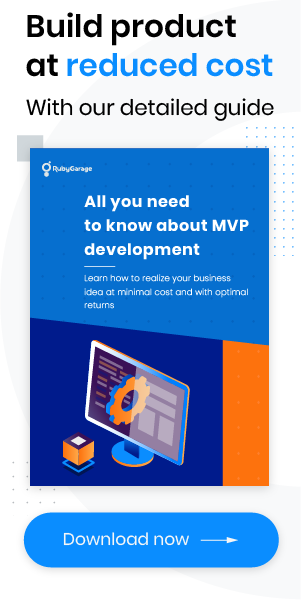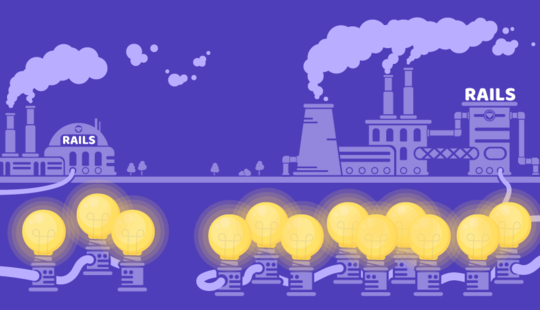-
Product Management
Software Testing
Technology Consulting
-
Multi-Vendor Marketplace
Online StoreCreate an online store with unique design and features at minimal cost using our MarketAge solutionCustom MarketplaceGet a unique, scalable, and cost-effective online marketplace with minimum time to marketTelemedicine SoftwareGet a cost-efficient, HIPAA-compliant telemedicine solution tailored to your facility's requirementsChat AppGet a customizable chat solution to connect users across multiple apps and platformsCustom Booking SystemImprove your business operations and expand to new markets with our appointment booking solutionVideo ConferencingAdjust our video conferencing solution for your business needsFor EnterpriseScale, automate, and improve business processes in your enterprise with our custom software solutionsFor StartupsTurn your startup ideas into viable, value-driven, and commercially successful software solutions -
-
- Case Studies
- Blog
Native vs Hybrid App Development
We are a custom mobile application development company and our frequent clients are those who are searching for specialists in this sphere. At the present moment there are several mobile systems in the market. Obviously, the question arises whether it is better to build native apps or hybrid ones. A native application is an executable program developed for usage on a particular platform / device. A hybrid application combines the capabilities of native apps and the flexibility of web apps. Here we decided to help you understand the basic differences of these two approaches and compare native and web-hybrid apps.
Having examined the pull of theoretical information and own empirical experiences in the topic under consideration, the common main points to be singled out are:
- Efforts to write a hybrid app are lower comparing to those of a native app.
- A native app has original UI unlike hybrid one.
- Both hybrid and native apps must correspond to certain rules to be published in Google Play or Apple’s App Store.
- The speed of native apps is the fastest one if the developer has necessary knowledge and technical skills.
- Development of one hybrid app is cheaper than a separate app building for every platform.
Still, is this the full information that allows to clarify the situation with native and hybrid apps? We in the RubyGarage team have summarized vast practice and profound knowledge of our highly qualified mobile application developers and grouped information into three categories:
- Technical aspects.
- Non-technical aspects.
- Preferences of leading world companies in mobile apps.
1. Native vs Hybrid App Development. Technical aspects
From the technical point of view, native and hybrid apps are both worth being used. Everything depends on wishes and aims of a customer and a developer. Besides, native and hybrid apps have access to native APIs. At the same time, they are drastically different in terms of UI, platforms, code portability and languages (table 1).
Table 1 Technical features: native vs hybrid
|
Aspect |
Native |
Hybrid |
|
Languages |
Native only |
Native and Web / web only |
|
Platforms |
Single for each platform |
Multiple |
|
User Interface |
Functionally rich and more attractive |
Never give users a fully native experience due to the necessity to record web technology usage |
|
Performance |
Faster and more reliable by its design |
Usually slower |
|
Access to native APIs |
High |
Moderate |
|
Updating |
Support of several versions, complex server part. Necessity to update the whole app to see the changes. The app’s code updates through the market. |
Regular update from the App Store. The app’s code can be updated without market. |
|
Security |
Common attacks in: Insecure local data storage; Weak SSL implementation; Unintended data leaks; Reverse Engineering; Code Injection. |
The same attacks as those of natives. |
|
Compatibility with other apps on the device |
Higher |
Less |
|
Ecosystem |
A rich ecosystem of tools |
Limited by developers ecosystem of community solutions and third party plugins |
|
Navigation |
A similar paradigm / built-in navigation schemes |
The WebView helps to combine existing content on the Web with native app capabilities |
|
Frameworks |
API provided by OS |
PhoneGap (on HTML5, CSS, JavaScript), Rubymotion (Ruby), Sencha Touch (on HTML5, CSS, JavaScript). |
Differences don’t mean problems or obstacles. If you know about them in the beginning, it is easier to understand in what way you should develop your product. It just saves time, money and your efforts.
2. Native vs Hybrid App Development. Non-technical aspects
Having studied all technical features of the potential mobile app, we now can proceed to non-technical aspects. Developing an application, the standpoint and preferences of a potential customer is of great importance.
Thus, the financial, time-consuming issues, ease of access and getting these apps take important place in making the right choice. As it is shown in the Table 2, while native apps are easy for receiving and being found in the stores, hybrid apps need less time to be launched to the market.
Table 1 Non-technical features: native vs hybrid
|
Aspect |
Native |
Hybrid |
|
Stores |
Available: Windows Store, Apple’s App Store and Play Store |
Available: Microsoft Windows Store, Google Play, Apple App Store. |
|
Developer’s learnability |
Slower (it is necessary to study development for each platform) |
Quicker (unnecessary to study how to write for each platform. The knowledge of one framework allows to create app for all platforms) |
|
Time of market launch |
Rather big (six or more months) |
Rather short (less than six months) |
|
Development cost |
Expensive |
Cheaper (more reasonable) |
|
Cash allocation |
Separate financing for each platform |
Financing in one stream |
|
Device specific features |
High availability |
Moderate |
|
Internet connection |
Depends on the app. The Internet connection is needed by: |
Mostly needs connection, as web part is to be renewed through the
Internet. |
This list helps to set priorities and clarify such important issues as: what it costs to develop an app, how much time is needed to be spent by a developer and how much time is needed to launch a product. Even having estimated every technical detail of the future product, it is still possible to fail. For instance, if your target audience has problems with finding it in the stores or it cannot be downloaded and set from the first time, or if it takes longer to get used to and to get to know how the app operates, your potential customers will lose interest and turn away from your mobile app, doesn’t matter if it is native or hybrid one.
3. Preferences of leading world companies in mobile apps
The demand analysis in the market of mobile application development has shown that 7 companies out of 11 use hybrid apps: OKCupid, Exfm, Rormix, HealthTab, Sabre Travel Network, Untappd, Banana Republic. Those who use native apps are: Facebook, LinkedIn, Redfin and Instagram.

During our work we have noticed that if a company needs access to every device sensor, the easiest solution is native apps that can offer more facilities and possibilities. The RubyGarage team bases its work on understanding the needs of every company, strategies of which vary from client to client. One is may be concentrated more on the interactive experience of their native applications, while others prefer to pay special attention to web side of their app. At the same time, if you have a complex set of requirements, you will have to build both native and web apps. It is a standard practice for companies to have many desktop applications with 3 or 4 mobile applications to support them.
Conclusion
Time doesn’t stand still. Every day some changes and improvements in the existing technologies are made. We regard 2015 as the dawn of a new stage in technological development, when the number of business building sites with the multiple apps has dropped drastically. There is no uniform solution regarding native and hybrid apps. Our experience shows that you will choose a native app more often if you are a private individual or startup owner ready to invest into the highest quality of own product. At the same time, the business owners focused on bringing the most value in less time usually prefer hybrid apps.













